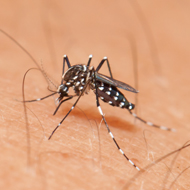Zika virus has pandemic potential, scientists say

"PAHO anticipates that Zika virus will continue to spread and will likely reach all countries and territories of the region where Aedes mosquitos are found."
The emerging mosquito-borne Zika virus now has 'explosive' pandemic potential, according to US scientists.
Since it was reported in Brazil in May last year, it has spread to 21 countries in the Americas (as of 23 January, 2016). This is of particular concern as there is growing evidence to suggest it could be linked with incomplete brain development in newborn babies.
It is primarily transmitted by Aedes mosquitoes, which are present in all of the Americas except Canada and continental Chile, meaning the virus is likely to spread further.
The Pan American Health Organization (PAHO) said in a statement: "PAHO anticipates that Zika virus will continue to spread and will likely reach all countries and territories of the region where Aedes mosquitos are found."
Another reason for its rapid spread, according to PAHO, is that it is new to the population of the Americas and therefore they have no immunity to it.
Whilst it generally causes only mild illness in humans, health authorities are currently investigating a possible link with microcephaly (abnormal smallness of the head) in babies.
Since Brazil reported the virus in 2015, there have been over 3,500 suspected cases - a 20-fold increase from 2010 through to 2014.
There is currently no vaccine for Zika virus. PAHO, which is a regional office of the World Health Organisation (WHO), says it is helping countries of the Americas to prepare for any possible spread through vector control, better surveillance and communication of prevention methods.
But scientists from Georgetown University, Washington DC, have said that lessons must be learnt from the Ebola epidemic. In July last year, the WHO Ebola Panel found that urgent warnings either failed to reach senior leaders, or senior leaders did not realise their significance.
Writing in the Journal of the American Medical Association, the team from Georgetown said that while the WHO has said it is supporting countries to control Zika, it 'is still not taking a leadership role in the Zika pandemic'.
An IHR emergency committee should be convened immediately, they added, saying that while Brazil, PAHO and the Centers for Disease Control have acted quickly, WHO headquarters have so far 'not been proactive'.
For the full study visit: http://jama.jamanetwork.com/article.aspx?articleID=2485361
For more information on Zika virus, see: http://www.who.int/mediacentre/factsheets/zika/en/



 FIVP has shared a survey, inviting those working in independent practice to share their views on the CMA's proposed remedies.
FIVP has shared a survey, inviting those working in independent practice to share their views on the CMA's proposed remedies.